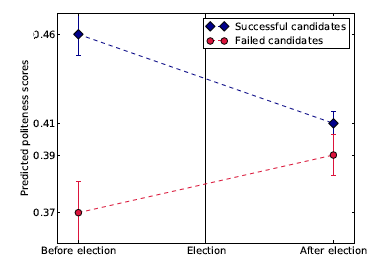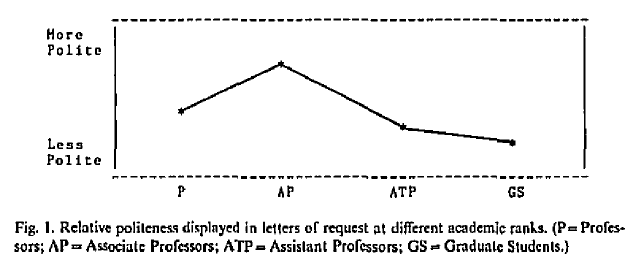Danescu-Niculescu-Mizil, Cristian, et al. “A computational approach to politeness with application to social factors.” arXiv preprint arXiv:1306.6078 (2013).
In this paper, the authors explore, existence of a relationship between politeness and social power. To establish this relationship, the paper uses data from two online communities (Wikipedia and Stack Exchange). These are requests directed at owners of talk-pages on Wikipedia and those directed towards authors of posts on Stack Exchange. The authors began by labeling 10,957 requests from the two data sources using Amazon Mechanical Turk, thereby creating the largest corpus of politeness annotations. Next, the authors detail 20 domain-independent lexical and syntactic features (or politeness strategies), grounded in politeness literature. The authors subsequently develop, two SVM based classifiers: ‘BOW’ and ‘Ling.’ for classifying polite and impolite requests (“ Did the authors forget to write about the ‘Alley’ classifier? 🙂 ”). The Bag of words (BOW) classifier using unigram features in the training data (i.e. labeled Wikipedia and Stack Exchange requests data) and served as a baseline. On the other hand, the linguistically informed (Ling.) classifier used the 20 linguistic features along with the unigrams and improved the baseline accuracy by 3-4%. In order to address the main research question of change in politeness, with change in social power the authors compare the politeness levels of requests made by Wikipedia editors, before and after they become administrators (i.e. before and after elections). The key finding is that the politeness score of requests by editors who successfully become administrators after public elections dropped, whereas the same increased for unsuccessful editors, as shown in the figure below.

Additionally, the authors present other interesting findings like: Question-askers are politer than Answer-givers, politeness of requests reduces as reputation increases on Stack Exchange, Wikipedians from the U.S. Midwest are the politest, female Wikipedians are generally more polite and there is significant variance in politeness of of requests in the programming language communities (0.47 for Python to 0.59 for Ruby).
The first question that came to my mind while reading this paper was, there may be other behaviors and traits that may be associated with requests and responses (or writing in general). For example, compassion, persuasiveness, verbosity/succinctness, quality of language. A nice follow-up to this work might be to re-run the study for these other qualities, maybe even using other datasets (say Q&A sites like: Quora, Answers.com, Yahoo Answers?). I do feel that there isn’t a huge difference between the politeness scores for successful versus failed Wikipedia administrator candidates especially after the election. I encountered this old (but interesting) paper which investigates politeness in written persuasion by examining a set of letters written by academics at different ranks in support of a colleague who had been denied promotion and tenure at a major state university in the U.S. One of the key findings of the study was that, “the formulation of a request is conditioned by the relative power of the participators”. The following plot from the paper, shows the relative politeness in letters of request by academics at different ranks.

This seems to suggest a different result when compared with those presented in Danescu-Niculescu-Mizil et al. We can clearly see that in this particular case the politeness in written requests generally increases with increase in academic rank. Maybe politeness has more contextual underpinnings that need to be researched. Also, this more recent paper in social psychology links, politeness with conservatism, whereas compassion with political liberalism. As, Danescu-Niculescu-Mizil et al. specify that “Wikipedians from U.S. Midwest are the most polite”, it would be interesting to validate such relationship between behaviors (like, politeness) and political attitudes established by prior social science literature. Some more questions one might ask here are: How polite are the responses of Wikipedia editors versus administrators? Do polite requests generally get polite responses? Are people more likely to respond to a polite request instead of a not so polite request? On the technical side, it might be interesting to experiment with other models for classification, say Random Forests, Neural Nets, Logistic Regression. Also, techniques for improving model performance like: bagging, boosting, k-fold cross validation might be interesting avenues of exploration. It may also be interesting to determine the politeness/impoliteness of general written text (say news articles, editorials, reviews, critique, social media posts) and examine how this affects the responses to these articles (shares, likes and comments).